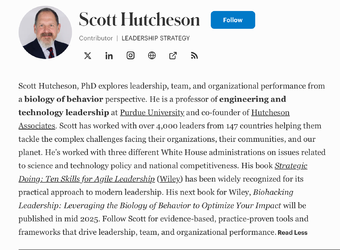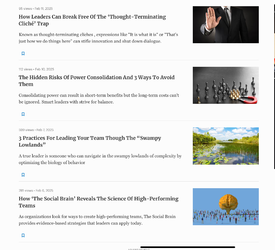L/A

Leaders can learn a lot from Mr. Rogers about kindness. GETTY IMAGES
Fred Rogers, known to millions as "Mr. Rogers," built an enduring legacy around a philosophy of kindness. While his television show nurtured generations of children, the principles he embodied—warmth, compassion, and connection—offer profound lessons for leaders. At Purdue University, I’ve taught a course in Leadership Philosophy, where we examine leadership through diverse lenses. Students tell me that one of the most memorable and impactful topics has been exploring Fred Rogers’ philosophy of kindness and how it applies to leadership. Let’s explore the leadership lessons we can draw from Mr. Rogers to lead with kindness and create lasting impact in our teams and organizations.
Kindness, however, is not a soft skill—it’s a strategic one. Leaders who consistently demonstrate kindness build trust and foster collaboration, unlocking the potential of their teams. Harvard Business Review recently underscored that kindness breaks down defensiveness, facilitates clarity in communication, and builds loyalty by giving credit where it’s due.
Fred Rogers understood this intuitively. By prioritizing kindness, he created an environment where everyone—from children to adults—felt safe to learn, grow, and connect. Leaders can harness the same principles to build resilient, innovative teams.
Leading with kindness isn’t just good for people—it’s good for business, too. By building a culture rooted in kindness, leaders can inspire trust, enhance creativity, and drive sustainable success. It’s a beautiful day in the neighborhood (or anywhere else) when kindness takes the lead.
About the Author:


Follow me on Twitter or LinkedIn. Check out my website or some of my other work here.

Leaders can learn a lot from Mr. Rogers about kindness. GETTY IMAGES
Fred Rogers, known to millions as "Mr. Rogers," built an enduring legacy around a philosophy of kindness. While his television show nurtured generations of children, the principles he embodied—warmth, compassion, and connection—offer profound lessons for leaders. At Purdue University, I’ve taught a course in Leadership Philosophy, where we examine leadership through diverse lenses. Students tell me that one of the most memorable and impactful topics has been exploring Fred Rogers’ philosophy of kindness and how it applies to leadership. Let’s explore the leadership lessons we can draw from Mr. Rogers to lead with kindness and create lasting impact in our teams and organizations.
The Case for Kindness
Why should leaders prioritize kindness? Studies show that kindness in the workplace leads to improved relationships, greater creativity, and stronger resilience. Amy Edmondson, a leading scholar on psychological safety, highlights that kindness is foundational to creating environments where people feel safe to express ideas and take risks. This aligns with the first rule of Strategic Doing, a biology-of-behavior approach to strategic transformation: Create and maintain a safe space for deep, focused conversation.Kindness, however, is not a soft skill—it’s a strategic one. Leaders who consistently demonstrate kindness build trust and foster collaboration, unlocking the potential of their teams. Harvard Business Review recently underscored that kindness breaks down defensiveness, facilitates clarity in communication, and builds loyalty by giving credit where it’s due.
Lessons From Fred Rogers
Fred Rogers approached every interaction with intentional kindness. Leaders can emulate this through three key lessons:- Break Down Barriers with Graciousness. In even the most challenging situations, Rogers led with warmth and understanding. Leaders can practice this by entering conversations with a smile, a warm greeting, and a genuine openness to others’ perspectives.
- Recognize and Celebrate Contributions. Rogers excelled at making everyone feel seen and valued. Leaders should make it a habit to recognize the contributions of their team members. A simple acknowledgment can inspire trust and loyalty while fostering a culture of collaboration.
- Create Space for Others. Rogers gave others the room to express themselves. Leaders can do the same by practicing active listening and ensuring their team members feel heard and respected. Avoid catching people off-guard; instead, prepare them for meaningful conversations that build understanding.
Building a Culture of Kindness
Andrew Swinand’s framework for creating a culture of kindness provides actionable routines for leaders. Swinand emphasizes three practices that leaders can adopt:- Practice Radical Self-Care. Leaders can’t pour from an empty cup. Prioritize physical, emotional, and mental well-being to show up as your best self.
- Master the Basics. Simply doing your job with excellence—showing up on time, meeting commitments, and delivering quality—sets the foundation for earning trust and respect.
- Connect With Intention. Go beyond transactional relationships. Ask about your colleagues’ lives, practice active listening, and show genuine care for their well-being.
The Biology of Kindness
Kindness is not just a moral virtue; it’s rooted in our biology. Neuroscience shows that acts of kindness activate the brain’s reward centers, releasing oxytocin and fostering connection. Leaders who practice kindness can create a ripple effect, as their actions encourage others to mirror that behavior. This ripple effect fosters a generative culture, where psychological safety and collaboration thrive.Fred Rogers understood this intuitively. By prioritizing kindness, he created an environment where everyone—from children to adults—felt safe to learn, grow, and connect. Leaders can harness the same principles to build resilient, innovative teams.
Kindness as a Leadership Strategy
Fred Rogers’ timeless philosophy of kindness offers leaders a roadmap for creating meaningful, impactful change. By breaking down barriers, celebrating contributions, and fostering connection, leaders can unlock the full potential of their teams. As Rogers himself said, “There are three ways to ultimate success: The first way is to be kind. The second way is to be kind. The third way is to be kind.”Leading with kindness isn’t just good for people—it’s good for business, too. By building a culture rooted in kindness, leaders can inspire trust, enhance creativity, and drive sustainable success. It’s a beautiful day in the neighborhood (or anywhere else) when kindness takes the lead.
About the Author:


Follow me on Twitter or LinkedIn. Check out my website or some of my other work here.

